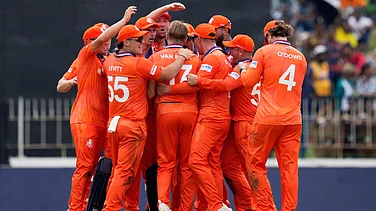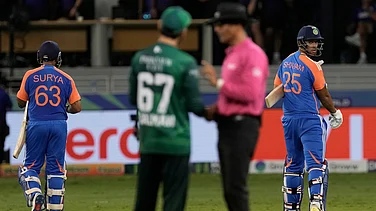THERE was no 'cricket correspondent' to report their feat. No live telecasts back home. There were no fancy hotels to stay in. No ratings to play up to. There were no cars up for grabs. No girlfriends hanging around. Nothing. Yet, last week, when the 10-nation Lombard World Challenge for the Under-15 Cricket Championship ended, "by Lord's, it was India".
And, 13 years after Kapil's Devils changed the course of cricket at Lord's, Reetinder Sodhi's 'Innocent Angels' ignored howls of 'Pakistan Zindabad' to make a dream come true. Says Kapil Dev: "In 1983, I never realised how it felt to win the World Cup. We were all so overcome. Thanks to the boys, I now know."
Win they did, against awesome odds. The Government had refused to fund the tour saying the BCCI was cash-flush. The BCCI, which made Rs 300 crore from the Wills World Cup, refused saying the School Games Federation of India, which sent the team, was not affiliated to the BCCI. When the boys were asked to pay Rs 40,000 each or skip the trip, Kapil stepped in. He donated Rs 2.5 lakh, and got corporate-friends to underwrite the rest. "It was sad to see such a rich organisation like the BCCI act stingy, " says Kapil.
The Indo-Pak clash, after Sri Lanka's Wills Cup triumph in March, is proof that the game's balance is swinging away from traditional powerhouses. Batting, bowling or fielding, teams from the subcontinent demonstrated complete mastery of the basics. "The Asian spirit is an unfettered bird," exulted Graeme Wright in The F .
Teams from eight Test-playing nations—India, Pakistan, Sri Lanka, South Africa, Australia, England, West Indies, Zimbabwe—as well as Canada and Holland, were in the fray. Wrote Christopher Martin-Jenkins in The Daily Telegraph : "India and Pakistan were not necessarily the best teams, but they were the most committed and best organised."
Free of the burden of expectations, the Indians chased the target in their six encounters. In the finals they ignored three pitch invasions by hooligans and sledging by the Pakistanis, led by Javed Miandad's nephew Faizal Iqbal, to win a match that was more a test of nerves than of skills.
Like 1983, it was a team effort. There were no star names in the Indian squad unlike Pakistan, which also boasted Abdul Qadir's son Imran and Majid Khan's son Bazid. But wicketkeeper-batsman Pradeep Chawla as pinch-hitter, openers Ravneet Singh and Gagan Singh, middle-order bats-men Mohammed Kaif and Bhuvan Chander, offspinner Ishan Ghanda and left-armer Rajiv Jolly proved their mettle.
Reetinder Sodhi, son of former Punjab player Mahesh Inder Singh, impressed Richie Benaud with his captaincy and all-round skills. Sodhi, said Martin-Jenkins, was destined for stardom. The Independent named him one of five players who might have an international future. And Ted Corbett of The Hindu asked: "How long before this lad wants Sachin's spot?"
Not so soon. But India's success did underscore the importance of catching them young. The tykes fielded exceedingly well. Sodhi bruised an elbow early in the finals, but took three wickets and scored a matchwinning 82—all in the same blood-stained shirt. The winners got £300 (about Rs 15,000) each.
However, crowd behaviour during the finals led to reservations on how such a tournament could impact young minds. Martin-Jenkins says there is a danger that the schoolboys' competition can become a vehicle for xeno-phobes, and could lead to "commercial exploitation inappropriate to amateur sport". But as South Africa's coach Bob Woolmer says, "It's an incentive for 13 and 14-year-olds whose interests must be retained so that they'll not take up other sports." The Indian coach, former Haryana offspinner Sarkar Talwar, says the tournament was invaluable for players seeking a wider canvas. Players like Rajiv Jolly, who at 13 became the youngest player after Sir Colin Cowdrey in 1946 to play at the Mecca of Cricket.
It wasn't sheer rivalry all the way. There was sportsmanship: against Canada, Windies skipper Zaheer Ali overruled an umpire's decision and called back a bats-man because he knew a catch had been taken on the bounce.
And there was enterprise: England hero Ian Botham's teenaged son, Liam Botham, volunteered to commentate on the tournament for Sky Sports, which telecast the semi-finals and finals. In the event, Liam didn't. Ian did: and he too was mighty impressed by what he saw.






















